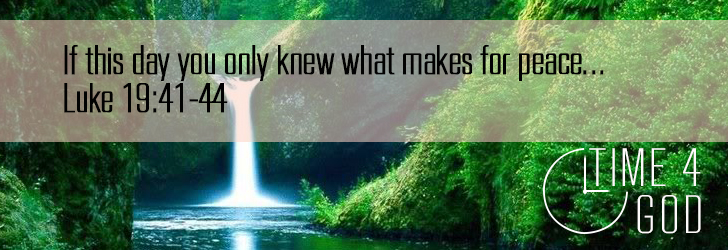What Makes for Peace
This may seem an odd message here in the middle of the Christmas season, but in the economy of eternity, and that of the Incarnation, it is relevant in every age.

This may seem an odd message here in the middle of the Christmas season, but in the economy of eternity, and that of the Incarnation, it is relevant in every age. It is our deepest desire to know peace in this life, yet it is so illusory, in our private as well as in our societal lives. There are, of course, lots of reasons for this. This moment in scripture comes at a crucial time in Jesus’ life. He is approaching Jerusalem. He knows that the end for which he came is drawing near, and more.
ʺAs Jesus drew near Jerusalem, he saw the city and wept over it…ʺ We can imagine his disciples seeing his tears, wondering at them, and trying to console their beloved teacher. He says to them, ʺIf this day you only knew what makes for peace, but now it is hidden from your eyes. For the days are coming upon you when your enemies will raise a palisade against you; they will encircle you and hem you in on all sides. They will smash you to the ground and your children within you; and they will not leave one stone upon another within you because you did not recognize the time of your visitation.ʺ (Luke 19:41-44) How this must have shocked them. These are difficult words. What could they mean?
[content-ad]
They all knew, as we do, that the times were difficult, that peace seemed a very distant memory, a desperately longed for hope. The disciples could not know that he was referring to the destruction of Jerusalem, the ʺCity of Peace,ʺ that would come almost 40 years later, when the Romans would put down a Jewish rebellion with unforgiving harshness in the year 70 AD. The Temple would be destroyed, with not one stone standing upon another. It would never be rebuilt. This would happen because they ʺdid not recognize the time of [their] visitation.ʺ This is a thought worthy of our contemplation today, in these days after our annual joyous celebration of the birth of Jesus. The world, in many ways, still does not recognize the ʺvisitationʺ that happened in those days and that remains with us today. It was as true then as it is now, that the peace we naturally desire can only come from Jesus. There is no other source for it. But the world is still rejecting the ʺvisitationʺ of Jesus. Christians this visitation personally, and there are still those who wish ʺto crush us and hem us in on all sides,ʺ because of it. Still, it is our holy duty to keep the vision of the visitation alive in this world, even in the face of the threat of destruction. We are to be the instruments of the peace of Christ. We know that even if we are persecuted for our faith, even if the ʺTempleʺ of our body is razed to the ground, we know that, like him, we will rise again. It is in our willingness to live the way of Christ that the hope of his peace remains in the world. The peace of Christ surpasses all things. It cannot be destroyed. Believe in Him and you will know that peace even in your darkest hours. Christ was born. Christ has died. Christ will come again! Amen.
SKM: below-content placeholderWhizzco for FHB

